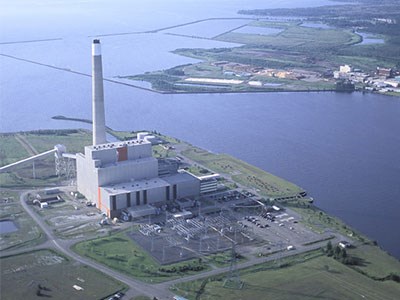The Thunder Bay Generating Station conversion from coal to biomass is on track for completion by year’s end, according to Ontario Power Generation.
Brent Boyko, OPG’s biomass business development director, said there’s been a successful test-burn at the generating station and the first batch of specialty black pellet “advanced biomass” has arrived in port, which is a major piece of the puzzle.
"We’ve just received, literally with in the last couple of days, the first allotment of fuel that we procured to fire the facility up in the near future,” said Boyko, during a break at the Canadian Bioenergy Association’s annual conference in early September in Thunder Bay.
The 7,500 tonnes of black pellets were obtained from Norway’s Arbaflame, one of only two suppliers of the product in the world. The other, Zilkha Biomass Energy, is based in Texas.
When it comes online, the Thunder Bay Generating Station will be the first total substitution of coal with black pellets commercially in the world. White pellets are the conventional, commonly used choice for biomass energy creation, but would have required a complex and expensive overhaul.
“The black pellets are, in all intents and purposes, a drop-in coal replacement,” said Boyko. “It’s a very new fuel; it’s evolutionary fuel. That 7,500-tonne order is the largest they've given to any utility out there.”
Despite the tricky logistics of acquiring the rare fuel, Boyko said adopting it made the generating station’s conversion viable. OPG has been working to meet the timeline imposed by Ontario’s regulatory commitment to get out of the coal- burning business by the end of this year.
Boyko compared the Thunder Bay conversion to the newly opened Atikokan Generating Station, retrofitted to burn white pellet biomass, to the tune of $170 million. The changes in Thunder Bay came with a considerably cheaper $5-million price tag.
“Basically, in Atikokan we built a whole new material-handling island, fast tracked it in a couple years’ time. This conversion is going to be relatively (quick), three or four months of conversions to conveyors, safety systems. It’s repurposing more of the original equipment.”
Black pellets can also be shipped in a similar fashion to coal, and unlike their more established white counterparts, they can be stored outdoors and are immune to moisture.
Also, there may be added flexibility down the line if the pellets are more widely adopted, which is a distinct possibility as regulators look to dial down coal power in the U.S. Boyko calls the black pellets a “game-changer south of the border” and says it’s a “nirvana fuel” because, in addition to being made of wood, black pellets can also be rendered from agricultural or municipal waste.
“You can feed in a little more variable quality feedstock and come out with a consistent high-quality end product. Although the direction in Ontario is not to go in that stream yet, we'll use wood that is procured in an environmentally sustainable manner.”
While OPG is staying mum on the price per tonne for the black pellets, there is a plan to beef up the stockpile of fuel in Thunder Bay with a fresh procurement request early next year, with Arbaflame and Zilkha as the only probable suppliers. Boyko said OPG is interested in purchasing the fuel closer to home. Both companies are open to licensing their technology to other producers.
“It can be a bolt-on addition to an existing white pellet plant, of which we have one being built in Wawa, we have one built in Thunder Bay, another one being built in Atikokan,” said Boyko, referring to the California-based Rentech Inc.’s two ongoing projects and Resolute Forest Products’ completed facility in Thunder Bay.
“So it’s up to the market to decide if they want to adapt that technology to produce the white pellet and black pellet streams on a more localized basis.”
But with the costs incurred in adapting the technology, and only a five-year commitment to burn black pellets at the generating station, that could be a hard decision for the market to make, he said.




